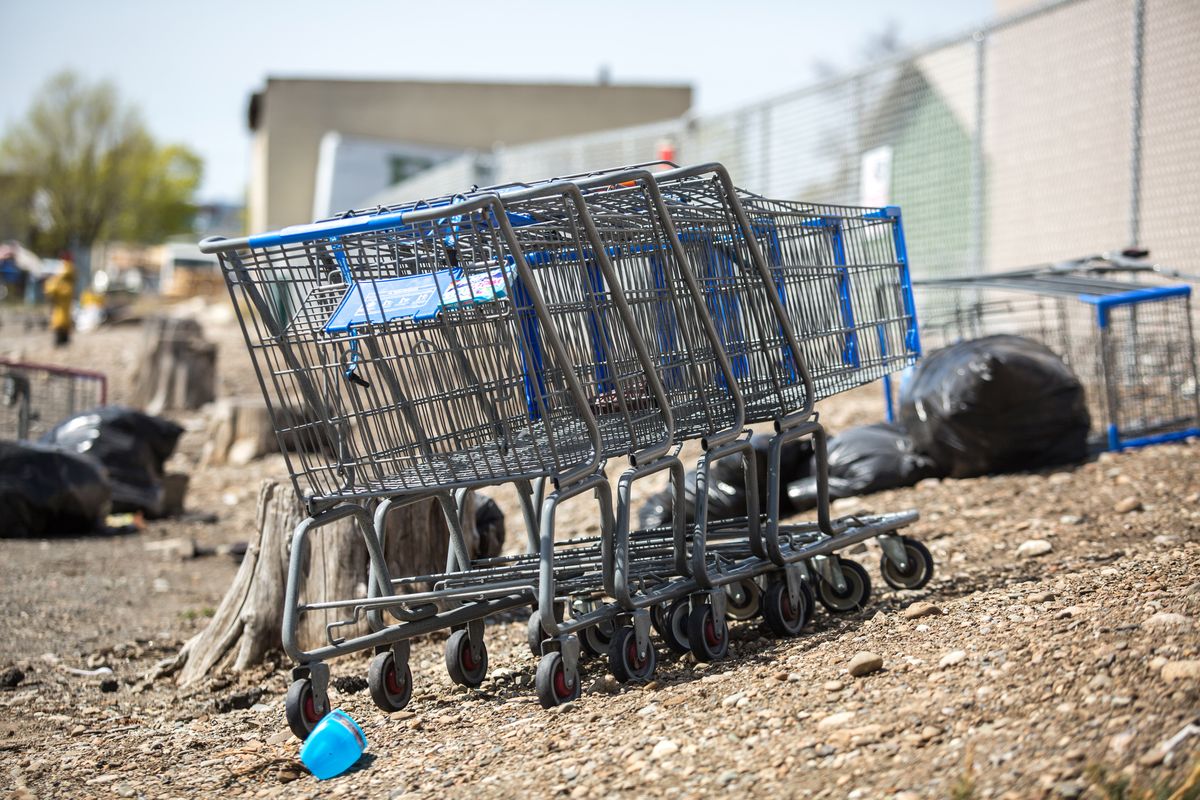Abandoned but not forgotten: Spokane Valley may tackle shopping cart problem

Once you start looking, they’re not hard to find.
On Monday afternoon, a few sat on an empty lot in front of Walmart. A trio, full of trash, was lined up next to some garbage cans on Custer Road. And the western side of Spokane Valley, along Sprague Avenue, was littered with shopping carts.
Advance Auto Parts General Manager Jhonny Montufar estimated he’s seen as many as 100 abandoned shopping carts in the area at once. They typically get cleared out after a few days.
“It really doesn’t affect us much,” Montufar said, “other than it being an eyesore.”
Spokane Valley’s abandoned shopping cart problem isn’t new – City Councilman Arne Woodard said the carts have bothered him for at least six years. But the city is weighing options to address the problem.
“They’re full of garbage, so it’s a health issue,” Woodard said. “It’s not good aesthetics.”
Spokane Valley staff members proposed the cart rules to the City Council after receiving numerous complaints about the carts from some businesses.
Cities have the power to dispose of public nuisances, Spokane Valley Deputy City Attorney Erik Lamb said, adding that these shopping carts, which often contain needles, clutter parking lots and even block traffic, are clearly a nuisance.
Spokane Valley officials are considering whether to adopt stricter rules for shopping carts. The proposal would allow the city to impose fines on retailers whose carts are stolen and abandoned around town.
It might seem strange to punish a business for being stolen from, rather than the thief, but many cities across the country have done exactly that to address abandoned carts.
For instance, Yakima ($115 fine) and Federal Way ($25 fine) already penalize retailers for abandoned shopping carts. Cities often give stores 14 days to pick up their carts before disposing of them – disposal often comes with an additional fine. A new shopping cart can cost a store anywhere from $150 to $600.
Lamb said the city would ideally punish the shopping cart thieves, not the stores. But, he said, it isn’t feasible to go after the people who steal the carts.
“If you don’t go after the retailers, then all of the citizens end up paying for it,” Lamb said.
In a trip to find abandoned carts in Spokane Valley earlier this week, a reporter located about 20 carts, nearly all of them from Walmart.
Woodard added, however, that wherever there’s a store with carts, it’s not uncommon to find that store’s carts nearby.
Walmart Director of Corporate Communications Beth Bruce said in an email that the store would abide by an abandoned shopping cart law if the city passes one.
“We do our best to ensure carts are collected promptly in our parking lots, and in some cases will try and recover the carts if they are close by off property,” Bruce said.
Council members Pam Haley and Tim Hattenburg said during a meeting earlier this month that they would prefer rules to include incentives to reduce fines for stores that have boosted cart security.
For instance, some stores throughout the country attach locking wheels onto their carts. If someone tries to take the cart, the lock activates and prevents the wheel from spinning. Lamb said in Spokane Valley, only Rosauers uses the locking wheels.
“If someone steals in that instance, they are really trying to steal,” he said, adding that if a store is taking meaningful steps to stop theft “we don’t want to go after you.”
Spokane Valley might not follow in Yakima’s or Federal Way’s footsteps, though. City Councilman Rod Higgins said he’d like to avoid the city becoming shopping cart police as much as possible.
“How about a subscription service?” Higgins asked. “They pay a fee, we pick up the carts?”
Whatever model the city chooses, it won’t be city staff handling the carts. Lamb said the city doesn’t have the manpower to do the work, or space to hold the carts. If the city coordinates the response, it would find contractors to do the work.
Woodard said he’d like to solve the problem with as little government involvement as possible.
“I would still prefer to incentivize and get voluntary cooperation,” he said. “I’m not real big on penalties.”